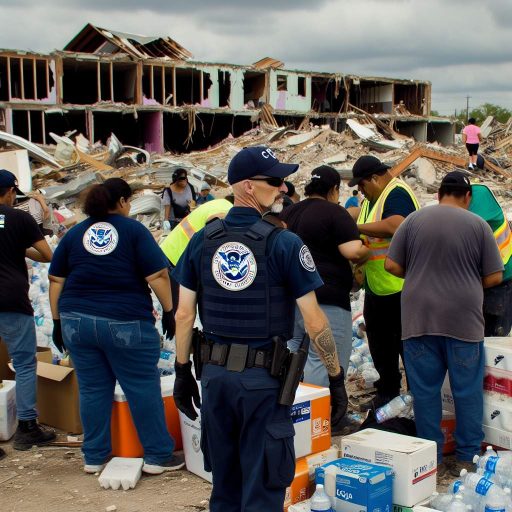Introduction:
Deputy sheriffs play a crucial role in law enforcement, ensuring public safety and upholding the law.
In rural areas, their responsibilities take on a unique and challenging dynamic.
Rural deputy sheriffs are often tasked with covering vast territories, requiring them to be self-reliant and resourceful in carrying out their duties.
They serve as first responders in emergencies, conduct investigations, and provide a visible presence in communities where law enforcement resources may be limited.
Additionally, deputy sheriffs in rural areas often engage in community outreach efforts to build trust and cooperation with local residents.
Their role extends beyond traditional law enforcement functions to include assistance in disaster response and support for other county agencies.
Deputy sheriffs in rural areas must possess a diverse skill set that includes knowledge of livestock, agriculture, and outdoor survival skills.
They work closely with other law enforcement agencies, emergency services, and community organizations to address the unique challenges faced in rural communities.
Overall, deputy sheriffs in rural areas play a vital role in maintaining public safety, preserving the rule of law, and fostering community partnerships for a safer and more secure environment.
Their dedication and commitment to serving their communities make them essential members of the law enforcement community.
As such, the role of deputy sheriffs in rural areas is not only crucial but also multifaceted, requiring adaptability, resilience, and a deep understanding of the unique needs of rural residents.
Deputy sheriffs in rural areas play a crucial role in maintaining law and order in remote communities.
Their responsibilities are diverse and essential for ensuring the safety and security of residents living in these secluded regions.
Patrolling remote areas and responding to emergencies:
- Deputy sheriffs are tasked with patrolling vast stretches of rural land to deter criminal activities and provide a visible presence to deter potential wrongdoers.
- They respond to emergency calls promptly, often being the first on the scene to provide assistance and ensure the safety of the community members.
- Patrols are conducted round the clock to ensure that rural areas are constantly monitored, especially during peak crime hours.
- Deputy sheriffs also conduct routine checks on remote properties to prevent burglaries and acts of vandalism.
Investigating crimes and accidents in rural communities:
- Deputy sheriffs are responsible for conducting thorough investigations into crimes and accidents that occur in rural areas.
- They gather evidence, interview witnesses, and collect information to build a strong case for prosecution.
- They work closely with other law enforcement agencies, such as state police and federal authorities, to solve complex cases that may involve multiple jurisdictions.
- Deputy sheriffs also provide support to victims of crimes in rural communities, offering guidance and assistance throughout the legal process.
Deputy sheriffs in rural areas play a crucial role in maintaining the safety and security of remote communities.
Their dedication and commitment to serving and protecting the residents of these areas are commendable, and they deserve recognition for their hard work and sacrifices.
Relationship with the community:
Deputy sheriffs in rural areas play a crucial role in fostering positive relationships with the community.
By actively engaging with residents, they can build trust and rapport that are essential for effective law enforcement.
In rural settings, where everyone knows each other, deputies have the opportunity to establish personal connections with the people they serve.
This familiarity helps in gaining valuable insights into community dynamics and addressing issues proactively.
Collaboration with local organizations and leaders is another key aspect of the deputy sheriff’s role in rural areas.
Transform Your Career Today
Unlock a personalized career strategy that drives real results. Get tailored advice and a roadmap designed just for you.
Start NowBy working closely with community groups, deputies can better understand the needs and concerns of residents.
Through partnerships with organizations such as neighborhood watch groups or community centers, deputies can enhance their visibility and accessibility within the community.
This, in turn, fosters a sense of security and strengthens the bond between law enforcement and the public.
In times of crisis or emergencies, these established relationships become invaluable.
Residents are more likely to cooperate and provide assistance to deputies they trust, leading to faster and more effective resolution of situations.
By maintaining open lines of communication with community leaders, deputy sheriffs can address issues before they escalate into major problems.
Local leaders often act as intermediaries between law enforcement and residents, providing valuable support in maintaining peace and order.
The relationship between deputy sheriffs and the community in rural areas is a vital component of effective policing.
Building trust, collaborating with local organizations, and engaging with community leaders are all essential for fostering a safe and harmonious environment for residents.
Delve into the Subject: State Trooper Training: What You Need to Know
Challenges Faced by Deputy Sheriffs in Rural Areas
Deputy sheriffs in rural areas encounter a unique set of challenges due to the nature of their work environment.
These challenges can vary from limited resources and manpower compared to urban areas to dealing with specific issues such as wildlife encounters and agricultural crimes.
Limited Resources and Manpower
- Rural areas typically have fewer resources and a smaller population to draw from compared to urban areas.
- Deputy sheriffs may have to cover vast geographic areas with limited backup or support available.
- This lack of resources can lead to longer response times and difficulty in handling emergency situations effectively.
- Furthermore, budget constraints in rural areas may limit the training and equipment available to deputy sheriffs.
Dealing with Unique Issues
- Wildlife encounters are a common challenge for deputy sheriffs in rural areas.
- Responding to calls involving wild animals such as bears, mountain lions, or snakes requires specialized training and skills.
- Additionally, agricultural crimes such as livestock theft or crop vandalism are prevalent in rural communities.
- Deputy sheriffs must be knowledgeable about these specific issues to effectively investigate and address them.
Deputy sheriffs in rural areas face a multitude of challenges that require them to be resourceful, adaptable, and well-prepared.
By understanding and addressing these challenges, deputy sheriffs can better serve and protect the communities they serve.
Gain More Insights: Impact of Technology on Highway Patrol Operations
When it comes to being a deputy sheriff in rural areas, specialized training and qualifications are essential.
Here are some of the requirements:
Specialized Training in Handling Rural Crime Scenes and Emergencies
- Deputy sheriffs in rural areas need to be prepared to handle unique challenges that may arise in remote locations.
- Training in areas such as wilderness survival, search and rescue, and off-road driving is crucial for deputies in rural settings.
- Understanding how to secure and process evidence in rural crime scenes is also a key component of specialized training.
Knowledge of Local Laws and Regulations Specific to Rural Communities
- Deputy sheriffs must be well-versed in the laws and regulations that pertain to rural areas, which may differ from urban environments.
- Understanding hunting and fishing regulations, property rights, and agricultural laws is essential for enforcing the law effectively in rural communities.
- Deputies need to build relationships with members of the community to gain insights into local customs and practices that can inform their enforcement efforts.
Deputy sheriffs in rural areas require specialized training and a deep understanding of the laws and regulations specific to the communities they serve.
By meeting these qualifications, they can effectively protect and serve rural populations.
Showcase Your Business Today
Reach thousands of readers actively exploring professional services. Publish your business profile and grow your audience now.
Publish NowDelve into the Subject: How to Protect High-Profile Clients
Role in Disaster Response and Management:
Deputy sheriffs play a crucial role in disaster response and management in rural areas.
Their responsibilities include:
- Assisting with evacuations and ensuring the safety of rural residents during natural disasters
- Coordinating with other agencies to provide relief and support to affected areas
During natural disasters such as floods, wildfires, or severe storms, deputy sheriffs are on the front lines.
They help communities evacuate and stay safe.
They work tirelessly to ensure that residents are out of harm’s way and have access to necessary resources.
Deputy sheriffs also collaborate with local emergency services, such as fire departments and paramedics, to coordinate a comprehensive response to disasters.
By working together, these agencies can effectively provide aid to those in need and minimize the impact of the disaster on rural communities.
In addition to immediate response efforts, deputy sheriffs are involved in long-term disaster management.
They help assess the damage caused by disasters, facilitate recovery efforts, and ensure that residents have access to the support they need to rebuild their lives.
Deputy sheriffs play a vital role in ensuring the safety and well-being of rural residents during times of crisis.
Their dedication and professionalism in disaster response and management make a significant difference in the recovery and resilience of rural communities.
Gain More Insights: Technology Used by ICE Agents in Their Work

Deputy sheriffs play a crucial role in maintaining public safety in rural areas.
They serve as first responders in emergencies when other law enforcement agencies are not readily available.
This immediate response can make a significant difference in critical situations.
In remote areas where law enforcement presence may be limited, deputy sheriffs provide a sense of security and protection to communities.
Their visibility alone deters criminal activities and promotes a safer environment for residents.
Role of Deputy Sheriffs in Rural Areas
When it comes to the role of Deputy Sheriffs in rural areas, collaboration with other law enforcement agencies plays a crucial part in ensuring the safety and security of the community.
Here are some key aspects of working together with different agencies:
Working with State Police
- Coordinating efforts with state police to ensure seamless communication and response to incidents that may cross state boundaries.
- Sharing information on criminal activities that may have statewide implications to effectively address them.
- Assisting state police in conducting investigations and providing additional manpower when needed in rural areas.
Collaboration with Federal Agencies
- Partnering with federal agencies such as the FBI, DEA, and ATF to combat organized crime, drug trafficking, and other federal offenses.
- Participating in joint task forces with federal agencies to target and dismantle criminal networks operating in rural communities.
- Leveraging federal resources and expertise to enhance the overall law enforcement capabilities in rural areas.
Engagement with Neighboring Sheriff’s Offices
- Establishing mutual aid agreements with neighboring sheriff’s offices to provide backup support during emergencies or large-scale incidents.
- Sharing best practices and training opportunities to enhance the skills and knowledge of deputies working in rural areas.
- Collaborating on special operations or task forces that require a regional approach to address specific crime trends or challenges.
Collaboration between Deputy Sheriffs in rural areas and other law enforcement agencies is essential for addressing cross-jurisdictional issues.
This partnership helps in sharing resources and intelligence, ensuring a coordinated response to crime in rural communities.
By working together seamlessly, law enforcement agencies can effectively combat crime and maintain the safety and security of rural areas.
Importance of Deputy Sheriffs in Rural Areas
Deputy sheriffs in rural areas are essential for maintaining law and order.
They serve as first responders in emergencies, providing critical assistance to the community.
These officers are tasked with patrolling vast territories, often in challenging conditions.
Their presence helps deter crime and provides a sense of security to residents.
Deputy sheriffs also play a key role in community outreach and building trust with locals.
Their dedication to serving remote areas showcases their commitment to public safety.
In rural environments, deputy sheriffs must often rely on their resourcefulness and adaptability.
Their role involves not only enforcing the law but also assisting in various community services.
Deputy sheriffs in rural areas must be highly skilled in a wide range of areas.
Their training and expertise are crucial for handling diverse situations effectively.
Their dedication and commitment to serving in remote and challenging environments are commendable.
Additional Resources
[E-Books for Sale]
The Big Book of 500 High-Paying Jobs in America: Unlock Your Earning Potential
$19.99 • 500 High-Paying Jobs • 330 pages
Explore 500 high-paying jobs in America and learn how to boost your career, earn more, and achieve success!
See All 500 High-Paying Jobs of this E-Book
1001 Professions Without a Degree: High-Paying American Jobs You Can Start Now
$19.99 • 1001 Professions Without a Degree • 174 pages
Discover 1001 high-paying jobs without a degree! Unlock career tips, skills, and success strategies for just $19.99!




